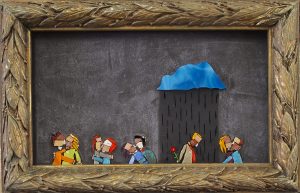2019 Update: As if we needed more proof . . . relationships and bodies function together. This article talks about loneliness, which is just another term for disconnection.
Everyone I love needs to read these four books.
- The Birth of Pleasure, Carol Gilligan
- The Artist’s Way, Julia Cameron
- Proof of Heaven, Eben Alexander
- How Connections Heal, Maureen Walker & Wendy Rosen (Eds.)
These books have all changed my life. But today, I want to focus on #4. How Connections Heal is written for therapist-types, but it explains the basic nitty-gritty about relationships and should be required reading for every high school senior and should be in every hotel nightstand drawer and every dentist’s lobby. I think it’s that important.
It’s about Relational-Cultural Theory (RCT), which posits that when we have mutually-affirming connections, we feel understood and valued. We thrive and get more creative and do our best work. We feel energy and excitement. We take better care of ourselves.
But when our relationships (even just one of them, if it’s important) make us feel diminished or one-down, when we lack equal power and voice……we suffer. We become depleted, depressed. We feel lost, lonely, bloated, unattractive, unstable, dull, unwanted, and out-of-touch. We eat and drink too much, shop too much, stare into our devices and stop looking forward to things. We feel unliked and unlovable. We wear gray and withdraw from social life. We doubt our sanity.
Relationship Disconnection Is Trauma. Here’s a story of non-mutuality (disconnection) in a friendship.
Sabine and Rachel’s friendship changed suddenly, and Sabine was confused. Rachel seemed distant and stopped returning calls. Sabine felt her friend pull away, but when she asked about it, Rachel waved her off and said, “Nothing’s wrong. I’ve just been super busy.” Then the distance got even worse over the course of six months and Sabine found herself excluded from gatherings of Rachel and their other friends. She felt abandoned and ashamed with no idea how to address the obvious rift in their connection. She thought, it must be my fault. She wondered, how do I feel so hurt when Rachel obviously feels nothing? Sabine got sick. First, a bronchitis that hung on for two months. Then, shingles. When she came to see me, she was having panic attacks and thoughts of suicide.
Disconnection and non-mutuality happen in marriages and work relationships and families. If I (like Sabine) consistently share more, express more vulnerability, reach out more, make myself more available, I will probably, at some point, feel bewildered and blame myself for being needy. If my feelings or perceptions are brushed off or laughed off, I will start to lose essential energy: an emotional hemorrhage that I can feel in my body. In RCT terms, this is Condemned Isolation and it causes us to doubt our essential worth in the world.
Condemned Isolation Is Trauma.
If this pattern sounds familiar, you may have traumatic disconnection in your relationships. Your body responds to condemned isolation like it responds to a physical assault. Contact me if you’d like to talk more about how to bring mutuality back into a relationship – or how to recover from this type of trauma and rebuild your confidence and zest for life.
[contact-form][contact-field label=’Name’ type=’name’ required=’1’/][contact-field label=’Email’ type=’email’ required=’1’/][contact-field label=’Website’ type=’url’/][contact-field label=’Comment’ type=’textarea’ required=’1’/][/contact-form]


Like to Subscribe?
Get notified when Deborah shares new ideas, art, and creative health information for you.
You have Successfully Subscribed!
We respect your privacy. No information will be shared.